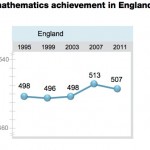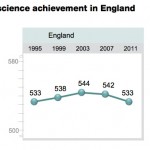Update
When I first heard the news this morning of the “shocking results of the OECD survey of literacy and numeracy in the UK” and given that the OECD is the originator of this study and PISA I jumped to the conclusion that this was just a rerun of the PISA tests writ large. The following quote comes from page 89 of the “Survey of Adult Skills Readers Companion” :
“Both the Survey of Adult Skills and PISA hold an action-oriented or functional conception of skills. The object of interest is the application and use of knowledge and know-how in common life situations as opposed to the mastery of a body of knowledge or of a repertoire of techniques”
Until such time as I have read the 124 pages of the Readers Companion and the 466 pages of the OECD Skills Outlook 2013 I will stick to my thesis that the state of education in England is not as bad as PISA and the Survey make out. As I point out at the end of this blog the only European country ahead of England in Maths in Year 9 in the TIMMS 2011 study was Finland.
Back to my original blog
We all know that this signals countless news programmes bemoaning standards in English state schools and of course this will give give Gove, the Secretary of State for Education, the opportunity to tell us why his policies need to be intensified (Academies can employ unqualified teachers [they are cheaper], they can create their own curriculum and all schools will be measured against performance on the “English Bac” – nothing to do with the International Baccalaureate of course which has a properly prepared, and internationally recognised curriculum). Come to think of it don’t today’s results reflect his policies in action?
One key point that always appears to be missed by Gove and commentators is that Education is now run separately in the four UK nations. In the TIMMS (see below) test the summary results are given for England and Wales whilst the PISA results are published for the UK. If this reporting is correct then trying to draw conclusions from this data for education in England is a foolhardy venture.
Those who have read this blog before will know how skeptical I am of the PISA test system and Mr Gove and his doings (http://bit.ly/16uWfHn, http://bit.ly/GJ0C82).
Today I came across an interesting web site http://ibm.co/15SVGIY that plots the 2009 PISA scores in Reading, Mathematics and Science against Gross Domestic Product per head (GDP/head). GDP is a measure of the output of a country and GDP/head therefore measures the wealth of a country, more or less. It would seem reasonable therefore that, in general, the higher the PISA score, the more capable the inhabitants of a country are, and therefore the higher the GDP per head that results (this is the sequence of causation that Robert Peston outlines on the BBC radio news today – 8th October 2013).
If there is no, or little, relationship then it is reasonable to ask why bother with the test since any deductions about education policies are likely to be worthless for practical purposes. Perhaps then the PISA test is just a rip-off concocted by academics to ensure their continual employment or by the OECD to enforce OECD propaganda as one critic has complained?
One does need to take care with this statistic. For example small countries that specialise in financial services or produce large quantities of oil are likely to have high GDPs. But their output is likely to be due to a small number of highly qualified expat employees and may not reflect the country PISA scores. For example Luxembourg has a Science score of 484 and a GDP/head of $118,000.
The graph below shows the results for Science Scores for 2009 vs GDP/head. The graphs for Mathematics and Reading are similar. What is most obvious is countries with scores of 490 and above show no constant relationship between PISA scores for Science and GDP/head. So Iceland with a score of 496 has a GDP/head of $53,100 whilst Latvia with a score of 494 has a GDP/head of $14,900 – only just above a quarter of the Iceland GDP/head. The UK has a score of 514 and a GDP/head of $43,300 whilst Singapore has a score of 542 and a GDP/head of $36,700.
However the results do give a warning. If your scores start to drop below 489 then there are no countries with a GDP/head above $40,000. High scores themselves are not a cause of high GDP/head. There are 7 countries with a score of 500+ but a GDP/head of less than $40,000. Four of these are ex-Eastern Bloc countries – Poland, Estonia, Slovenia and Hungary. The other three are New Zealand, Japan and Singapore.
Another study I have referred to before is the Trends in International Mathematics and Science or TIMMS http://bit.ly/GETskJ. The first results were published for the 1995 test for Scotland on the one hand and England and Wales on the other. Neither came in the top 10.
England (and Wales) have been in the top 10 at grade 4 maths in 2003, 2007 and 2011 and at grade 8 in 2007 and 2011. Scotland is still not in the top 10 but it may not have taken part since 1995.
In Science at grade 4 England (and Wales) were in the top 10 in 1995, 2003 and 2007 and at grade 8 were in the top 10 in 1995, 1999, 2007 and 2011. Once again Scotland was not in the top 10
A more detailed report on 2011 results at http://bit.ly/1aiJfTP (to download just chapter 1 http://bit.ly/1bUtxQV) indicates that Scotland and Wales did not take part in 2011 so the summary results that are published in the press and on the web may be confusing.
This report shows the following results for England in maths and science at Year 9 (grade 8):
The results for Year 5 (grade 4) are similar. To see the graph turn down as it does is disappointing but as the numbers go 2011 is not statistically different from 2007. The only European country higher in 2011 than England in Maths was Finland and in Science it was Finland and Slovenia. The TIMMS results show that there is no need to panic and that education in England is still good compared to our competitors.
So I advise you to take everything you hear about PISA over the next few weeks with a big pinch of salt.
As I have said before in this blog all the evidence from research shows that in order to improve we should
- Prioritise family interventions with the responsible adult or adults in families at risk of their children failing to get 5 A* to C at GCSE.
- Improve interventions with less well off children so that they get free breakfast and lunch at school, that there are plenty of after-school clubs to help motivate them as well as study periods so they can get their homework done. The school day should run from 7.00am to 6.00pm so parents have time to travel to and from work and we should be prepared to spend the money on extra staff to make this happen.
- Boys and girls, bright and not so bright all learn in different ways in different subjects. Thanks to a piece of groundbreaking research done in the 1970s in England we know that, contrary to expectations, there can be very wide variations in the types of reasoning used from 5 to 16. Bringing all pupils up to the standard required by the modern world (at least to what is called concrete generalisation reasoning) requires experienced, intelligent and well trained teachers capable of adapting their teaching and classroom management style according to the wide range of pupils they will face in the course of a day – let alone a career, not the unqualified teachers that Gove is allowing to roam untrammeled over English schools.
- The English Democrats industrial policy calls for the building up of strong, innovative and competitive business clusters of all sorts in every county and city in England. In this environment local schools and business will be funded to prepare a curriculum that takes into account the skills and qualifications the cluster is forecasting it will need over the medium term. They would not base their curriculum on boarding school memories no matter how fond they were.
- Schools need to continue to build up transparent, formal quality systems that will ensure that cheating does not take place (whether inspired by a pupil or a member of staff) and carries out honest, fair, and open teacher performance reviews that are honestly and truly recorded and acted on.
- If England is to succeed government must stop browbeating teachers, stop basing the curriculum on fond personal memories, stop refusing to pay attention to well founded educational research and stop de-professionalising our teachers because an unqualified instructor can deliver the latest fashion in teaching programmes from abroad at much less cost.
Does Gove see things this way? I think not.



